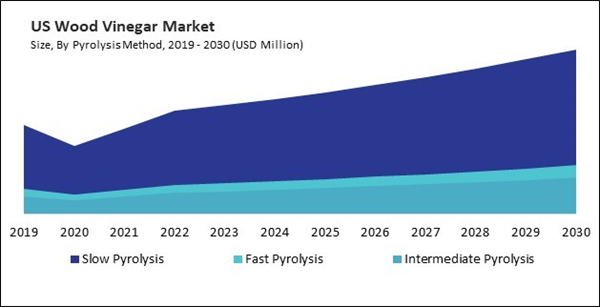In the food sector, wood vinegar serves as a natural food additive and preservative, enhancing flavor profiles and extending shelf life in products ranging from sauces and condiments to pickled vegetables and meats. Medicinally, wood vinegar finds application in traditional and alternative medicine practices, renowned for its purported health benefits such as anti-inflammatory, antimicrobial, and detoxifying properties. Therefore, the US market utilized 18.96 tonnes of wood vinegar in Food, Medicinal & Consumer Products in 2022.
The US market dominated the North America Wood Vinegar Market by Country in 2022 and would continue to be a dominant market till 2030; thereby, achieving a market value of $1,915.4 Thousands by 2030. The Mexico market is experiencing a CAGR of 7.2% during (2023 - 2030). Additionally, The Canada market would exhibit a CAGR of 7% during (2023 - 2030).
Wood vinegar's antimicrobial properties make it a valuable additive in food processing. The growing food processing sector is an important driver for the wood vinegar market. As per the data from the Government of Canada, in 2022, the food and beverage processing industry were the largest manufacturing industry in Canada in terms of production value, with sales of goods manufactured worth $156.5 billion. In 2022, processed food and beverage product exports reached a noteworthy $54.3 billion in value, reflecting a 14.1% growth compared to 2021. This figure accounted for 34.7% of the total value of production.
In addition, bacterial contamination poses a significant risk to food safety, leading to foodborne illnesses and product recalls. Particularly effective against Escherichia coli, Salmonella spp., and Listeria monocytogenes, wood vinegar inhibits the proliferation of common foodborne pathogens. By disrupting bacterial metabolism and cellular functions, wood vinegar creates an inhospitable environment for pathogens, thus reducing the risk of foodborne contamination and ensuring consumer safety.
The United States has a significant livestock industry, including cattle, poultry, swine, and aquaculture. Wood vinegar's rich composition of organic acids and bioactive compounds is a valuable nutritional supplement in animal feed formulations. Wood vinegar enhances nutrient absorption, promotes digestive health, and supports overall animal well-being; wood vinegar contributes to improved feed efficiency and animal performance in the U.S. livestock sector. Hence, the rising animal feed and organic farming sector in North America will assist in the growth of the wood vinegar market in the region.
Based on Pyrolysis Method, the market is segmented into Slow Pyrolysis, Fast Pyrolysis, and Intermediate Pyrolysis. Based on Application, the market is segmented into Agriculture, Animal Feed, Food, Medicinal & Consumer Products, and Others. Based on countries, the market is segmented into U.S., Mexico, Canada, and Rest of North America.
List of Key Companies Profiled
- VerdiLife Inc.
- Sane Shell Carbon Pvt. Ltd.
- Ace (Singapore) Pte Ltd.
- Nettenergy BV
- TAGROW CO., LTD.
- Applied Gaia Corporation
- Penta Manufacturing Company, LLC
- Byron Biochar
- Taiko Pharmaceutical Co., Ltd.
- Doi Shoten Co., Ltd.
Market Report Segmentation
By Pyrolysis Method (Volume, Tonnes, USD Million, 2019-2030)- Slow Pyrolysis
- Fast Pyrolysis
- Intermediate Pyrolysis
- Agriculture
- Animal Feed
- Food, Medicinal & Consumer Products
- Others
- US
- Canada
- Mexico
- Rest of North America
Table of Contents
Companies Mentioned
- VerdiLife Inc.
- Sane Shell Carbon Pvt. Ltd.
- Ace (Singapore) Pte Ltd.
- Nettenergy BV
- TAGROW CO., LTD.
- Applied Gaia Corporation
- Penta Manufacturing Company, LLC
- Byron Biochar
- Taiko Pharmaceutical Co., Ltd.
- Doi Shoten Co., Ltd.









